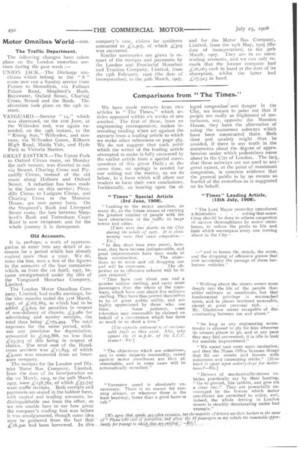Comparisons from "The Times."
Page 8

If you've noticed an error in this article please click here to report it so we can fix it.
We have made extracts from two articles in " The Times," which articles appeared within six weeks of one another. The first of these, from an engineering correspondent, makes interesting reading when set against the extracts from a leading article to which we make other references on page 485. We do not suggest that each point which the writer of the leading article attempted to make is fully answered by the earlier article from a special correspondent of this great Daily ; at the same time, no apology is needed for our setting out the matter, as we do below, in a form which will allow our readers to form their own conclusions. Incidentally, as bearing upon the al " Times" Special Article (3rd June, 1908).
"Looking to the motor omnibus, as many do, as the future means of carrying the greatest number of people with the least obstruction of the traffic in large
towns and cities. . ."
[There were two deaths in the City during the whole of t9o7. It is slow. moving vans that cause congestion.— En.]
"In this short time (two years), however, they have become indispensable, and great improvements have been made in their construction. . . The objections as to noise and oil dropping can and will be overcome. . . . The ob. jection as to offensive exhaust will be in part removed."
"They have cost about one and a quarter million sterling, and c.arry more passengers than the whole of the tramways, which have cost about five millions sterling. They have thus proved themselves to be of great public utility, and are highly appreciated by those who use them Some_ patience, some toleration may reasonably be claimed on behalf of a conveyance which has done so much in so short a time."
[The opposite statement i.s at variance with facts as they exist, Also, why ignore the 16 rn.p.hr. of the L.C.0 . trams ?—F.T).] "The objections which are sometimes, and in some respects reasonably, raised against motor omnibuses are thus all remediable, and in some cases will be automatically remedied."
"Excessive speed is absolutely unnecessary. There is no reason for running always, or wherever there is the least headway, faster than a good h.anscm cab."
[rye agree that speeds are often excessive,but of'' Please take.cth f jiours,,Iv/s, and allow' tin tunity for passdge to whith they ,aVc en 0t14" —E leged congestion' and danger in the City, we venture to point out that if people are really so frightened of motorbuses, say, opposite the Mansion House, they have the alternative of using the numerous subways which have been constructed there. Both time and anxiety might thus be avoided, if there is any truth in the statements about the degree of apprehension under which pedestrians move about in the City of London.. The fact,.., that these subways are not used to any great extent, at the point of maximum congestion, is concrete evidence that the general public is by no means so, fearful of the motorbus as is suggested on its behalf.
"Times" Leading Article, (15th July, 1908),
The Lord Mayor yesterday introduced
a deputation . , . asking that something should be done to relieve congestion of narrow thoroughfares by motor omnibuses, to reduce the perils :to life and limb which encompass every one moving about in the City-
—"and to lessen the stench, the noise,. and the dropping of offensive grease that now accompany the passage of these barbarous vehicles.'' Walking about the streets enters more deeply into the life of the people than either railways or omnibuses, but that fundamental privilege is encroached upon, and in places rendered unuseable, except at great personal risk. . . . Mr. Gladstone seems incapable of discriminating between use and abuse."
"So long as any engineering monstrosity is allowed to ply for hire wherever its owners please to go, and at any pace they may find convenient, it is idle to look for sensible improvement."
" We spend vast sums upon 'sanitation, and then the Home Office licenses things': that fill our streets and houses with poisonous and nauseating stinks." 1110w muchis spent upon orderly-boys for motorbuses ?—En.
"Drivers of mechanically-driven vehicles practically say by their hooting, "Go to ground, like rabbits, and give me a clear run." They are powerfully encouraged by the license which motor omnibuses are permitted to 'enjoy, and,. indeed, the whole driving in London streets is steadily deteriorating under bad example." .
the majority of drivers ass' their hooters in the sense e3i passengers on my vehicle the reasonable Worn.]




















